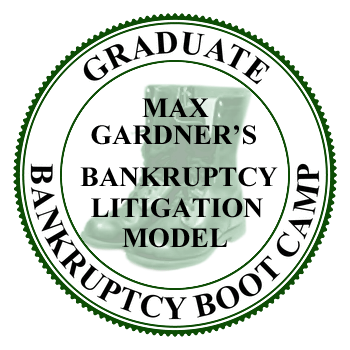You’ve got two choices – fight the lawsuit or let the collector get a judgment against you.
Once you receive the Summons and Complaint, you’ve got a very short amount of time to take action.
If you don’t file an Answer to the Complaint within a short period of time then you risk a default judgment against you.
That judgment allows the creditor to seize your bank accounts or assets, garnish your wages, file a lien against your home, and more.
In addition, the collector can force you to come to court to testify under oath about your assets.
And once that happens, there’s not much that can be done to stop the creditor from ruining your financial life for a long time.
The Smart Move Is To Defend The Lawsuit

When you defend the lawsuit, you get your chance to make the collector prove every part of their case.
Does the collector have the right to collect the debt? Make them prove it.
Have they calculated the correct amount due? Make them prove it.
Have they followed the collection laws? Make them prove it.
Here’s What The Collection Lawyers Don’t Want You To Know
We Can Help You Fight Back – And Win.
I’ve been protecting innocent consumers against debt collectors for nearly 20 years. And though no lawyer knows everything, I’m confident that I’ve seen most of the tricks the debt collectors play to take advantage of people.
I was one of the first lawyers in the entire country to uncover how debt collectors were selling old credit card accounts and then forcing people to pay them back after bankruptcy by refusing to update their credit reports.
As an instructor at the prestigious Max Gardner Bankruptcy Boot Camp I taught alongside some of the most sought-after consumer protection lawyers.
And I’m not only a graduate of the inaugural session of The Student Loan Law Workshop, I’m also a regular teacher at the event. Over the past four years I’ve helped teach hundreds of lawyers how to represent student loan borrowers against lenders.
For the past decade I’ve spoken countless times before numerous bar associations on the subject of consumer protection, creditor harassment, student loans, and credit reporting issues.
Some of the associations that have sought me out include:
- National Association of Consumer Bankruptcy Attorneys
- National Association of Consumer Advocates
- Central District of California Bankruptcy Attorneys Association
- Central California Bankruptcy Associations
- Brooklyn Bar Association
- Association of the Bar of the City of New York
- King County Bar Association
Teaching other attorneys how to practice in the field means I not only understand the complex regulations that govern debt collection, but I am also uniquely able to explain those tough concepts clearly and simply.
It also means the news media seeks me out whenever they’ve got questions about consumer protection issues. Over the years I’ve been interviewed by:
- New York Times
- Wall Street Journal
- CBS MoneyWatch
- Crain’s New York Business
- New York Daily News
- Connecticut Law Tribune
- Investment News
When you’re being sued for a past due bill – whether it’s a student loan company like National Collegiate Student Loan Trust, a debt buyer like Midland Funding, or a credit card company like Discover Bank or Citibank – don’t you deserve the lawyer who teaches other lawyers?





Here’s What You Get When We Work Together
My job is to do all the work, so you don’t have to.
You hire a lawyer to do the heavy lifting, not to print papers and give you instructions. That’s why I believe in giving you my best work and the highest level of service.
For example, I will do all of this for you:
- review your entire case with you to determine the right defenses;
- draft, serve and file all court documents on your behalf;
- conduct discovery in your case (this is the formal process of exchanging information between the parties about the witnesses and evidence they’ll present at trial);
- attend all court hearings in the case;
- review all of the debt collector’s information with you to help decide whether it’s appropriate to settle the case or go to trial; and
- negotiate the best possible settlement for you (unless we decide that it’s more appropriate to go to trial).
If we decide that it’s better to go to trial than settle, you will not be charged any additional legal fees.
I’ll also look into whether any of your rights under the state or federal collection laws have been violated. If they have, I may sue for money damages on your behalf. Lawsuits for money damages due to violations of your collection rights are usually handled on a contingency basis, which means we don’t get paid unless we collect money on your behalf.